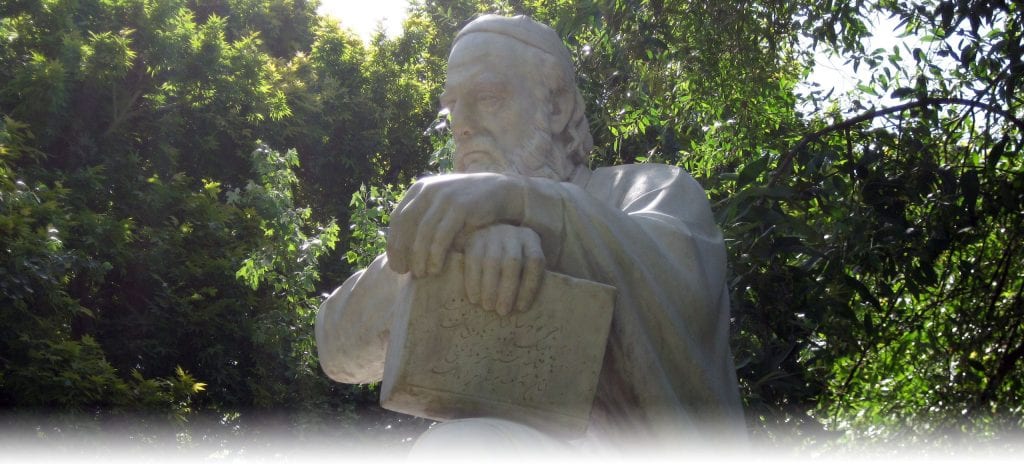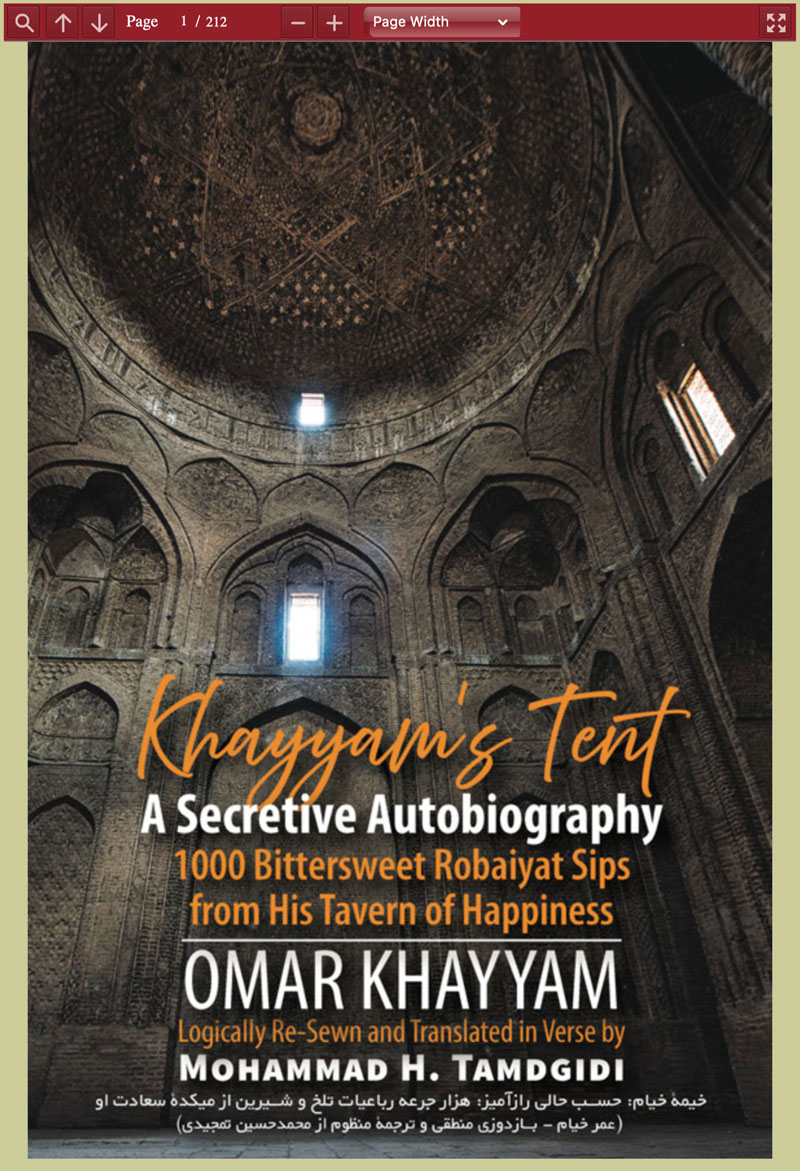Welcome to Okcir
OKCIR: Omar Khayyam Center for Integrative Research in Utopia, Mysticism, and Science (Utopystics) (est. 2002) is an independent research and publishing initiative dedicated to exploring, in a simultaneously world-historical and self-reflective framework, the human search for a just global society.
Since the world’s utopian, mystical, and scientific movements have been the primary sources of inspiration, knowledge, and/or practice in this field, OKCIR aims to critically reexamine the shortcomings and contributions of these world-historical traditions—seeking to clearly understand why they have failed to bring about the good society, and what each can integratively contribute toward realizing that end.
OKCIR aims to develop new conceptual (methodological, theoretical, historical), practical, pedagogical, inspirational and disseminative structures of knowledge whereby the individual can radically understand and determine how world-history and her/his selves constitute one another.
The center promotes creative exercises in liberating sociology and alternative pluriversities of knowledge production and publication in the global cyberspace. As a virtual research center, its publications are available online in its free-access digital library and in other academic database member-stacks, and for purchase online via the Okcir Store and other online distributors. Selected publications are also available in print for online purchase by libraries, institutions, and interested print readers.
For more information about the center, please visit here.
Free-Access OKCIR Library
OKCIR Newsletter
Special Issue on Mahmoud Darwish (1941-2008), the National Poet of Palestine
For My Mother
— by Mahmoud Darwish
I long for my mother's bread,
For my mother's coffee,
For her touch.
Childhood memories grow up in me,
Day after day.
I must be worth my life
At the hour of my death,
Worth the tears of my mother.
And if I come back one day,
Take me as a veil to your eyelashes.
Cover my bones with the grass,
Blessed by your footsteps.
Bind us together
With a lock of your hair,
With a thread that trails from the back of your dress.
I might become immortal,
Become a God,
If I touch the depths of your heart.
If I come back,
Use me as wood to feed your fire,
As the clothesline on the roof of your house.
Without your blessing
I am too weak to stand.
I am old.
Give me back the star maps of childhood
So that I,
Along with the swallows,
Can chart the path
Back to your waiting nest.
This 2009 (VII) special issue of Human Architecture: Journal of the Sociology of Self-Knowledge entitled “‘If I touch the Depth of Your Heart …’ : The Human Promise of Poetry in Memories of Mahmoud Darwish” is a commemorative issue on the life and poetry of the late Palestinian poet, Mahmoud Darwish, co-edited by a group of UMass Boston faculty and alumni. Mahmoud Darwish was and is regarded as Palestine’s national poet. He wrote the Palestinian Declaration of Palestine used for the formal establishment of the state of Palestine as declared on November 15, 1988, in Algiers, Algeria. Other than keynote opening statements, the special issue is comprised of a selected series of longer and shorter poems by Mahmoud Darwish, followed by commemorative poetry and essays/articles that directly or indirectly engage with Mahmoud Darwish’s work and/or the subject matter of his passion and love, Palestine and human rights and dignity.
For more information about the special issue of Human Architecture journal on Mahmoud Darwish, please visit here.
OKCIR’s Views on Creative Humanist Research and Publication
Humanist research, in OKCIR's view, must be treated as a creative work and conducted in a unitary and transdisciplinary way. Its publications must therefore be also treated as any creative work of art is treated.
Modern practices of university research are in essence panoptic mechanisms for disciplining and policing innovative and creatively spirited faculty and students alike. They entangle them in intricately and preemptively devised repetitive and hypnotic academic structures, procedures, and tasks that perpetuate their pre-publication self-/censorship in the name of science and in the interest of preserving the knowledge status quo. Scholars who are hired are often subjected to such disproportionate service and teaching duties to recycle and maintain existing knowledge that they end up having no time left to do their primary duty of engaging in critical new research to question outdated knowledge.
Tenure traps, impossibly "blinded review" fallacies, and laughable "self-publishing" labelled stigmas and scarecrows are employed as structural and subliminal panoptic strategies to discourage, exclude, and incarcerate creative works by young and not-so-young scholars worldwide, so as to serve (or to exclude their creative energies pitifully and despairingly from) a Westernized university world-system whose essential function is to maintain a neocolonial, not an egalitarian and liberating, world order.
For more on this topic see "About OKCIR," and for its further discussion, you can read Tamdgidi, M. H. 2005/6. “Editor’s Note: Peer Reviewing the Peer Review Process,” Human Architecture: Journal of the Sociology of Self-Knowledge. v. IV, ns. 1&2 (Fall/Spring), vii-xv; also see the editorial note and the articles "Science and Its Malfunctions" by Klaus Fischer (Universität Trier, Germany), and "Scientific Peer Review: An Analysis of the Peer Review Process from the Perspective of Sociology of Science Theories" by Lutz Bornmann (Swiss Federal Institute of Technology Zurich, Switzerland) in Human Architecture: Journal of the Sociology of Self-Knowledge, vol., VI, issue 2, 2008, titled "Sociological Imaginations from the Classroom Plus A Symposium on the Sociology of Science Perspectives on the Malfunctions of Science and Peer Reviewing.
| … let me share with you a story the late Jesse Reichek (1916-2005), a dear undergraduate advisor of mine and a noted painter and “Professor of Design” at U.C. Berkeley, shared with me once—one that can give the reader a hint about his unusual teaching and advising style as well.
There is much learning material in this anecdote, which he shared with me when I was about to receive my doctorate (he also served as an external examiner on my dissertation committee). At the time, I had completed my dissertation but was not sure of depositing it, getting my degree “paper,” and moving on to an academic career. This was at a time when, as briefly related above, I doubted whether joining the academia would divert me from the path I had envisioned to take as a conclusion of my doctoral studies. Recalling this story now, I find that it has a new meaning and significance for me today. At that time, hearing my doubts about an academic degree and career, Reichek asked during one of our long phone conversations: “Did I tell you the story of the Marine on the beach!?” I said, “no!” So, he continued: Well, … there was this Marine, wandering around the beach, picking up pieces of paper one after another, examining each and then throwing it back to the ground, saying every time, “no, this is NOT it!” Superiors became quite worried about the Marine’s behavior, so they said to themselves, “he must be losing his mind… he is due for an exam!” So, they took in the Marine and put him through many, many tests. At the end, they concluded that he had surely gone mad, so they gave him his discharge paper and let him go …. The soldier, excitedly looked at the discharge paper and said to himself: “Yes … THIS IS IT!” |
Integrative and Critical Studies on Utopia, Mysticism, and Science
To read the full content of the following publication in embedded PDF format, please click on its image below.
| Utopistics is the serious assessment of historical alternatives, the exercise of our judgment as to the substantive rationality of alternative possible historical systems. It is a sober, rational, and realistic evaluation of human social systems, the constraints on what they can be, and the zones open to human creativity. Not the face of the perfect (and inevitable) future, but the face of an alternative, credibly better, and historically possible (but far from certain) future. |


